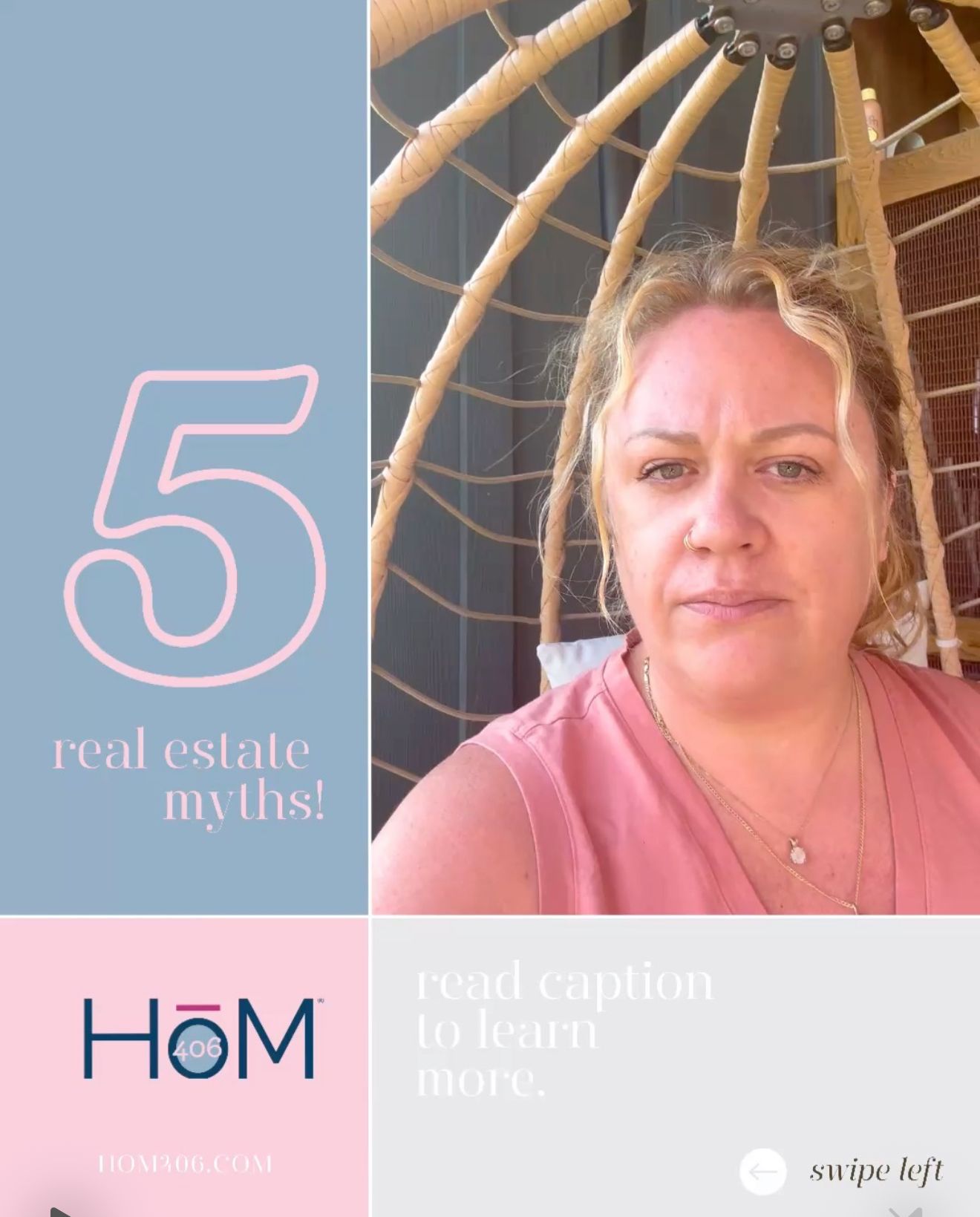HōM 406
LIVE BOZEMAN STYLE
News
Debunking Real Estate Myths: Myth #1
This is a subtitle for your new post

Home Buying Myth #1: Buyers need 20% down to enter the market.
Home purchases and financing are often interconnected, and for first-time buyers, the perceived down payment required to obtain a loan and enter the housing market can be daunting.
Here’s the good news! The idea that borrowers need at least 20% of the purchase price saved for a down payment to buy a home is a myth. In today’s fast-changing lending market, there are a plethora of loans available to well-qualified buyers, offering options that might suit your needs as a first-time buyer.
Notes to consider: Regardless of the loan type you select, Loan Origination and Closing Costs will be an additional, often overlooked expense. These costs are typically about 1.5 percent of the loan amount. For zero-down loan programs, Borrowers can roll the closing costs into the loan, allowing them to borrow up to 103% of the property value. In Montana, buyers do not pay a stamp tax or sales tax when purchasing a property! So, aside from closing costs, the purchase price on your BuySell and the compensation negotiated with your Buyer Representative is the amount you’ll pay at closing.
In markets where buyers have leverage, such as our current market conditions, it might be possible to negotiate an offer that requires the seller to cover some or all of your closing costs. Reach out to me for details and to learn more about how you could potentially offset your closing costs or lower your monthly payment through interest rate buy-downs that are seller-funded.
How do you secure the best loan? Outstanding loans aren’t available to everyone; good credit is essential. To give yourself the best chance of obtaining competitive financing, make sure that for at least six months before buying, all credit card bills, rent checks, car payments, and other debts are paid in full and on time. Even better is a year of consistent on-time payments! If you aren’t sure where your credit standing, start by inquiring with your local bank. Tools like Credit Karma are helpful for renting, but they don’t provide an accurate picture from all credit bureaus, which is required by home lenders.
Choose Your Lender Type: Mortgage financing can be obtained through mortgage bankers, brokers, savings and loan associations, mutual savings banks, commercial banks, credit unions, and insurance companies. Each option has different costs and benefits for the borrower. Mortgage brokers have access to more third-party lenders, allowing them to be more aggressive with financing options. Mortgage bankers fund their investments with the bank’s private capital, making them more conservative but potentially cheaper to borrow from. Every lender has its pros and cons! Be sure to talk with us to explore which options might be the best fit for you.
Most traditional loan programs require a minimum credit score of 640, while high-interest loans available through mortgage brokers may accept a score as low as 580. To ensure you fully understand your loan terms, federal regulations now enforce strict financing timelines that require lenders to provide a clear overview of all aspects of their loan offers, including interest rate, origination costs, and APR for the duration of the loan. Providing all the necessary information during your initial pre-approval meeting is crucial for a smooth mortgage process and a reasonable closing timeline. Remember, not all lenders are the same, and the details of the origination costs matter. A low interest rate might not mean it's your cheapest loan!
Expect to spend about an hour with your lender during your first meeting. To help move things along, be sure to bring copies of your last two years of Federal Income Tax Returns, including all pages and W-2s, as well as your two most recent pay stubs and your two most recent months’ statements for all assets listed on your loan application, such as checking, savings, investments, 401K, IRA, etc. Be ready to draft a letter of explanation for any NSF charges appearing on your bank statements.
If using gift funds, a gift letter from the donor to the recipient will be required, along with a copy of the check or transfer. DO NOT MAKE A LARGE DEPOSIT NOW! Please wait until your lender instructs you on how they want to see the gift funds utilized. Be aware that FHA loans require the last two months’ bank statements from the donor to verify they can give the gift and that the funds originate from a traceable source.
Once you’ve completed a loan application and received a pre-approval letter from your lender, you are ready to start your home search or proceed with refinancing your property. If this is a new purchase, the bank will require a complete copy of the Buy-Sell Agreement signed by both Buyer and Seller before moving forward. In transactions with HōM 406, your REALTOR® advocate will provide those documents to your lender, with your permission.
What type of loan is best for you?
There are thousands of loan options from various lenders. Still, choosing the right loan for you usually depends on several key factors, including the minimum down payment, interest rate expenses, and property type requirements. Different programs have different requirements, limitations, and costs.
PMI or Private Mortgage Insurance Cost: If you borrow more than 80% of the property's value, lenders will require the mortgage to be insured against default by an external party like the Veterans Administration (VA), the Federal Housing Administration (FHA), or a private mortgage insurer (PMI). Thousands of VA, FHA, and PMI loans are issued each year. This isn't a bad way to enter the housing market; it just comes with additional monthly costs.
Understanding Loan Types:
· RD - 0% down (income limits apply, PMI applies)
· FHA - 3.5% down (loan limits apply, PMI applies for the life of the loan, limitations on condo purchases)
· Conventional – 3%, 5%, 10% down (loan limits apply, PMI applies)
· Conventional – 20% down (loan limits apply, no PMI)
· Jumbo Loan (minimum loan amount applies)
Additional Considerations and Opportunities:
Are you a first-time homebuyer? The term "first-time buyer" usually refers to someone who hasn't owned property in the past three years, according to most state programs. These programs often provide smaller down payments and lower interest rates to help buyers enter the competitive real estate market. Did you know that Montana offers a state-tax-free savings account for home buying? Ask us about that!
If you are retaining additional property, your lender will require a list of any properties you plan to retain, along with the property tax bill, annual insurance statement, and mortgage statements.
Divorce: If you are divorced, a divorce decree will be needed. If you receive alimony or child support, or are obligated to pay either, bring relevant documentation such as an assignment of debt or a division of property.
The opportunity to purchase a home or refinance your existing property is exciting! Whether your goal is to utilize the gain in your property to pivot your portfolio, or you are moving out of renting, the experts at HōM 406 have the tools to ensure a smooth transaction. Let us guide you to your next adventure!




